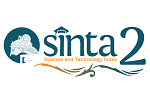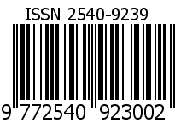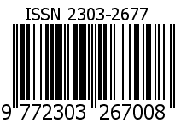Policy of providing open-access e-books at LIPI during the Covid-19 pandemic
Abstract
The policy of providing open-access e-books is one form of information disclosure carried out by LIPI in building a public facility in the form of a credible and innovative source of scientific literacy, particularly related to scientific publications of publicly funded research results. This research analyzed the policy of providing LIPI e-books in 2020-2021 in the Covid-19 pandemic. This study used a qualitative approach with a case study method. Data collection was carried out in May-June 2021 through in-depth interviews with two informants, a literature review, and observation of document searches related to the policy of providing open-access e-books at LIPI Press. The results indicated that the policy was fulfilled by implementing the Local Knowledge Acquisition Program and the Open Monograph Press (OMP) electronic publishing system. This policy has effectively increased the visibility, accessibility, and usefulness of scientific books during the Covid-19 pandemic. This can be seen from the increasing number of access to LIPI Press e-books provided through OMP throughout 2020-2021. However, the lack of understanding of open access among the public is a challenge in providing e-books. At the same time, the limited number of human resources who handle the electronic publishing information technology system is a fundamental problem in developing an e-book publishing system. This study concludes that the basis and implementation of the policy for providing open-access e-books are feasible to be maintained and improved, especially as a form of accountability for public funds used for public knowledge sources.
Keywords
Full Text:
PDFReferences
Batubara, J. (2017). Paradigma penelitian kualitatif dan filsafat ilmu pengetahuan dalam konseling. Jurnal Fokus Konseling, 3(2), 95–107. https://doi.org/10.26638/jfk.387.2099
Björk, B. C. (2017). Scholarly journal publishing in transition- from restricted to open access. Electronic Markets, 27(2), 101–109. https://doi.org/10.1007/s12525-017-0249-2
BRIN Indonesia (2021, A. 5). (2021). Seri 2: Penyediaan sumber literasi pengetahuan lokal berbasis e-book open access [Video]. YouTube. BRIN Indonesia. https://www.youtube.com/watch?v=_ZCGzohcyEs
Bull, M. J. (2016). Open access and academic associations in the political and social sciences: Threat or opportunity? European Political Science, 15(2), 201–210. https://doi.org/10.1057/eps.2015.88
Cope, B., & Kalantzis, M. (2014). Changing knowledge ecologies and the transformation of the scholarly journal. In A. COpe, B., & Phillips (Ed.), The Future of the Academic Journal (Second edition) (pp. 9–83). Chandos Publishing. https://www.elsevier.com/books/the-future-of-the-academic-journal/cope/978-1-84334-783-5
Eve, M. P. (2017). Open access publishing models and how OA can work in the humanities. Bulletin of the Association for Information Science & Technology, 43(5), 16–20. https://asistdl.onlinelibrary.wiley.com/doi/epdf/10.1002/bul2.2017.1720430505
Fuchs, C., & Sandoval, M. (2013). The diamond model of open access publishing: Why policy makers, scholars, universities, libraries, labour unions and the publishing world need to take non-commercial, non-profit open access serious. TripleC: Communication, Capitalism & Critique, Journal for a Global Sustainable Information Society, 11(2), 428–443. https://doi.org/10.31269/triplec.v11i2.502
Grenina, A. (2012). Electronic books: Content provision and adoption possibilities among users in Latvia. Information Research, 17(1), 32–47. http://informationr.net/ir/17-1/paper512.html
Hutchinson, J. (2021). Micro-platformization for digital activism on social media. Information, Communication & Society, 24(1), 35–51. https://doi.org/10.1080/1369118X.2019.1629612
Johnson, R. (2019). From coalition to commons: Plan S and the future of scholarly communication. Insights, 32(1), 5–10. https://doi.org/10.1629/uksg.453
Peraturan Nomor 11 Tahun 2020 tentang Program Akuisisi Pengetahuan Lokal, Agustus 2020. Berita Negara Republik Indonesia Tahun 2020 Nomor 860. Jakarta. https://peraturanpedia.id/peraturan-lembaga-ilmu-pengetahuan-indonesia-nomor-11-tahun-2020/
Peraturan Nomor 6 Tahun 2020 tentang Organisasi dan Tata Kerja Balai Media dan Reproduksi, 23 April 2020. Berita Negara Republik Indonesia Tahun 2020 Nomor 399. Jakarta. https://paralegal.id/peraturan/peraturan-lembaga-ilmu-pengetahuan-indonesia-nomor-6-tahun-2020/
LIPI Press’s OMP. (2020). E-service publishing LIPI press. LIPI Press’s OMP. https://e-service.lipipress.lipi.go.id/press/catalog
LIPI Press. (2020). Hadapi era penerbitan 4.0, LIPI Press terapkan OMP. LIPI Press. https://lipipress.lipi.go.id/detailpost/hadapi-era-penerbitan-40-lipi-press-terapkan-omp
LIPI Press. (2021). Laporan kinerja Balai Media dan Reproduksi LIPI Press tahun 2020. LIPI Press. https://drive.google.com/file/d/1-CN6s8gQW9mpCh8jCgA4g2yNtGSOoH0_/view
Mahelingga, D. E. I. R. (2020). Penerbitan buku ilmiah daring berbasis open monograph press (OMP). Berkala Ilmu Perpustakaan Dan Informasi, 16(2), 155–169. https://doi.org/10.22146/bip.v16i2.265
Mukhroman, I., & Gumelar, R. G. (2022). Information literacy on the dangers of Covid-19 in Serang City. Jurnal Kajian Informasi & Perpustakaan, 10(1), 1–14. https://doi.org/10.24198/jkip.v10i1.30693
Prasetya, Y., & Rahmi, R. (2022). Students ’ s performance and utilization of Universitas Indonesia Library during the pandemic. Jurnal Kajian Informasi & Perpustakaan, 10(1), 15-28. https://doi.org/10.24198/jkip.v10i1.32740
Undang-Undang Republik Indonesia Nomor 3 Tahun 2017 tentang Sistem Perbukuan, 29 Mei 2Ol7. Lembaran Negara Republik Indonesia Tahun 2OI7 Nomor 102. Jakarta. https://peraturan.bpk.go.id/Home/Details/37640/uu-no-3-tahun-2017
Rahmawan, D., Mahameruaji, J. N., & Janitra, P. A. (2020). Strategi aktivisme digital di Indonesia: Aksesibilitas, visibilitas, popularitas dan ekosistem aktivisme. Jurnal Manajemen Komunikasi, 4(2), 123–144. https://doi.org/10.24198/jmk.v4i2.26522
Reitz, J. M. (2014). Online dictionary for library and information science. ODLIS: Online Dictionary for Library and Information Science. https://products.abc-clio.com/ODLIS/odlis_about
Ross, D. (2014). A publisher’s perspective on. NISO. https://www.niso.org/niso-io/2014/06/publishers-perspective-challenges-open-access
Sahidi. (2017). Peran kebijakan open access informasi dalam membangun komunikasi ilmiah di perpustakaan perguruan tinggi. JUPITER, 16(1), 43–50. https://journal.unhas.ac.id/index.php/jupiter/article/view/4214/2407
Škorić, L., Glasnović, A., & Petrak, J. (2020). A publishing pandemic during the COVID-19 pandemic: How challenging can it become? Croatian Medical Journal, 61(3), 79–81. https://doi.org/10.3325%2Fcmj.2020.61.79
Slim, C. (2020). Access in academic publishing and what it means for different stakeholders. The Journal of Publishing Culture, 10(1), 1–13. https://journalpublishingculture.weebly.com/uploads/1/6/8/4/16842954/cslim.pdf
Taylor, J. (2020). Publishers act amid COVID-19 pandemic. International Publishers Association. https://www.internationalpublishers.org/news/954-publishers-act-amid-covid-19-pandemic
Ule, J. (2020). Open access, open data and peer review. Genome Biology, 21(86), 1–3. https://doi.org/10.1186/s13059-020-02005-3
Vrana, R. (2014). Access to digital information resources as a support to academic achievement. Central European Conference on Information and Intelligent Systems, 144–344. http://archive.ceciis.foi.hr/app/public/conferences/1/papers2014/672.pdf
Walters, W. H. (2013). E-books in academic libraries: Challenges for sharing and use. Journal of Librarianship and Information Science, 46(2), 85–95. https://doi.org/10.1177/0961000612470279
Yanti, & Krismayani, I. (2018). Pengaruh aksesibilitas jurnal elektronik berlanggan terhadap kepuasan pemustaka di UPT Perpustakaan Universitas Diponegoro Semarang. Jurnal Ilmu Perpustakaan, 7(2), 1–12. https://ejournal3.undip.ac.id/index.php/jip/article/view/22857/20934
Yusnimar. (2014). E-Book dan pengguna perpustakaan perguruan tinggi di Jakarta. Al-Maktabah: Jurnal Komunikasi Dan Informasi Perpustakaan, 13(1), 34–49. https://journal.uinjkt.ac.id/index.php/al-maktabah/article/view/1572/1322
DOI: https://doi.org/10.24198/jkip.v10i2.36260
Refbacks
- There are currently no refbacks.
Copyright (c) 2022 Author(s)

This work is licensed under a Creative Commons Attribution-ShareAlike 4.0 International License.
Jurnal Kajian Informasi & Perpustakaan Indexed by:
Jurnal Kajian Informasi & Perpustakaan
Program Studi Perpustakaan dan Sains Informasi d.h. Program Studi Ilmu Perpustakaan
Fakultas Ilmu Komunikasi, Universitas Padjadjaran
Jl. Raya Bandung-Sumedang Km. 21 Jatinangor, Sumedang, Indonesia 45363
WA: +62 813-1323-7581 (Chat Only)
Telepon: +62227796954
Faksimile: +62227794122
email: jkip.fikom@unpad.ac.id
Jurnal Kajian Informasi & Perpustakaan is licensed under a Creative Commons Attribution-ShareAlike 4.0 International License
Jurnal Kajian Informasi & Perpustakaan supervised by:












2.png)
.png)



